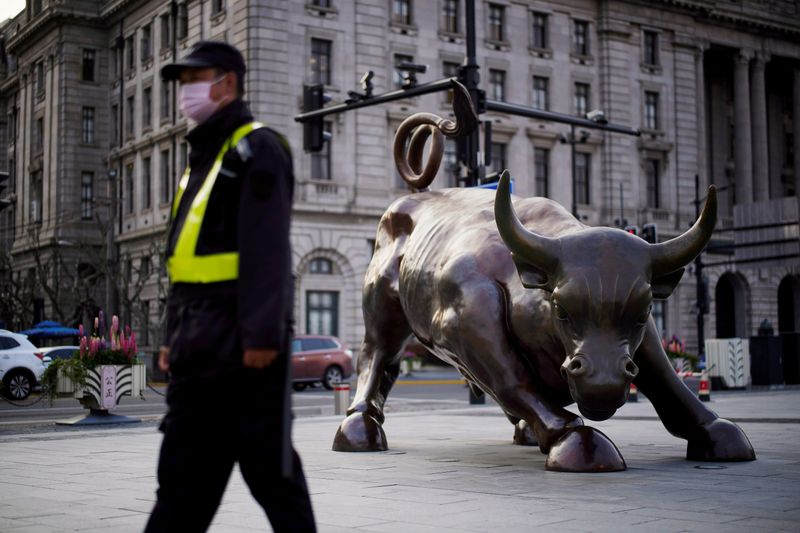By Ambar Warrick
Investing.com-- Asian stocks fell sharply on Monday, with Chinese chipmakers leading declines on new U.S. trade curbs, while broader sentiment was dented by fears of more hawkish measures from the Federal Reserve.
The blue-chip Shanghai Shenzhen CSI 300 index sank 0.9%, while the Shanghai Composite index shed 0.4%. Chipmaking stocks including Anji Microelectronics Tech Co Ltd (SS:688019) and Chengdu Xuguang Electronics Co Ltd (SS:600353) plummeted as much as 20% after the White House unveiled export controls cutting off Chinese companies from certain semiconductor chips made with U.S. equipment.
Hong Kong stocks were also rattled by the move, with the Hang Seng index losing nearly 3%. Tech heavyweights Alibaba Group Holding Ltd (HK:9988), Baidu (NASDAQ:BIDU) Inc (HK:9888) and Tencent Holdings Ltd (HK:0700) fell between 2% and 4%.
The U.S. move threatens to worsen trade ties between the two largest economies in the world, and could have deeper economic implications if China retaliates.
Sentiment towards China was also worsened by data over the weekend showing the country’s services sector unexpectedly shrank in September, amid continued COVID-related disruptions. A recent resurgence in infections has also raised concerns over more lockdowns.
Focus this week is also on the 20th Congress of the Chinese Communist Party, which is expected to outline government policies for the next five years.
Broader Asian stock markets fell sharply on Monday, although trading volumes were muted due to holidays in Japan and South Korea.
Australia’s S&P/ASX 200 index fell 1.4%, with miners suffering heavy losses on the prospect of weakening demand in China. Philippines’ PSEi Composite index was the worst performer in Southeast Asia, down 1.1%.
India’s blue-chip Nifty 50 index fell 1.3%.
Regional stocks took a weak lead-in from Wall Street, which plummeted on Friday after stronger-than-expected U.S. jobs data gave the Federal Reserve little reason to soften its hawkish tone.
Focus this week is also on U.S. CPI inflation data for September, due on Thursday. The reading, which is expected to show that inflation remained hot through last month, will also factor into the Fed’s stance on interest rates.
Markets are pricing in an over 80% chance the central bank will raise interest rates by 75 basis points in November. Rising U.S. interest rates have been the biggest headwind to Asian markets this year, and are likely to keep markets depressed for the near-term.
